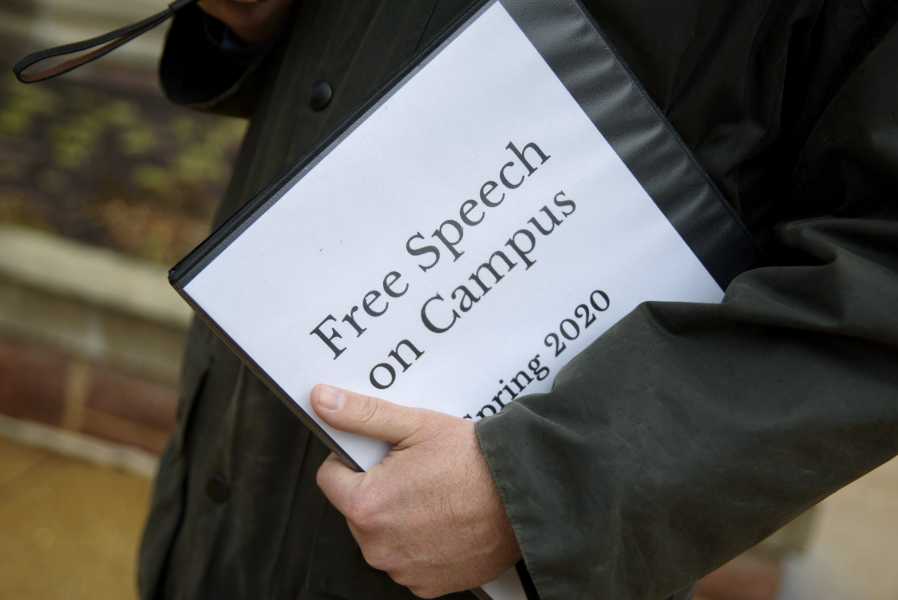State of the Union: A recent lawsuit against Texas State University highlights the importance of defending free speech across the nation.

Photo by Nick Schnelle for The Washington Post via Getty Images
Texas State University has recently come under scrutiny for their policy that allows students to anonymously report their peers to the administration if they feel verbally “harassed” in any way, either on or off campus. Texas State University students are concerned that the criteria for “harassment” are too vague, and that the policy will cause unnecessary restrictive “self-censorship” at their school.
Speech First is an organization that was created to fight against toxic and unnecessary violations of free speech on campuses across the United States. When Texas State University students came forward to inform them of their situation, Speech First launched a lawsuit against the school. On January 16, Speech First filed its opening brief to the U.S. Court of Appeals for the Fifth Circuit over this lawsuit. The fight for Texas State’s students’ free speech is therefore ongoing and serves as a significant example of the current trend of conservative voices being silenced through fear and draconian measures of censorship.
Cherise Trump, Speech First’s executive director, further explained the issue at Texas State to provide more context to those interested in this particular case and its wider implications on students’ rights to free speech on college campuses in an exclusive email interview with The American Conservative.
TAC: Why would Texas State have a policy in place that does not fulfill the Davis standard?
Trump: Many universities have multiple harassment and anti-discrimination policies that do not follow current federal standards. In fact, these policies may initially seem redundant considering all campuses already have Title IX policies that follow the standard set forth by the U.S. Supreme Court known as the Davis standard, which protects students from harassment without infringing on their First Amendment rights. However, universities that have these separate non-Title IX harassment policies incorporate definitions that deviate from Davis and often define harassment to include constitutionally protected speech. In the case with Texas State, their harassment policy specified that “offensive” speech is a reportable offense. This is not only confusing for students when there are multiple campus policies and definitions regarding harassment, but it is a clear violation of students’ First Amendment rights when they can be reported for merely expressing an opinion or idea that someone may subjectively find offensive.
TAC: Why did Texas State change its discrimination policy during the original lawsuit?
Trump: When we launched our initial lawsuit, Texas State defended their policy. It wasn’t until it became clear during the proceedings that they would lose the case that they then changed their policy in order to avoid a District Court ruling against them. Aside from the fact that the new policy still chills student speech and, therefore, violates their First Amendment rights, the university changing its policy after vigorously defending it is an obvious attempt to evade a judicial ruling on the matter and now puts students in a precarious position, since the university could bring back the original policy at any time. We are hopeful the Fifth Circuit will rule on the original policy and hold Texas State University accountable.
TAC: What is the effect of students’ self-censoring in places like Texas State and in colleges across the country?
Trump: Across the country, we have seen a decrease in students’ ability to engage with one another about the prevailing political and social issues of the day. Professors shy away from holding open discussions in the classrooms out of fear of being accused of creating “unsafe environments.” Without debate and open inquiry, intellectual growth will become stagnant. Universities should be encouraging students to address difficult topics, challenge each other as well as themselves, but instead they prefer to encourage students to report on one another, defer to figures of authority whenever they feel uncomfortable or unsure, and to shut down any dissenting ideas.
TAC: How does this situation compare to the larger fight for free speech on college campuses across the U.S.?
Subscribe Today Get daily emails in your inbox Email Address:
Trump: All over the country, we see university campuses with multiple harassment policies that tack on additional definitions of harassment that are not specified at all in the current federal rules. These campuses are sidestepping what have been well-thought-out federal standards that rely on U.S. Supreme Court precedent. Universities notoriously overregulate student speech in attempts to manipulate the types of political views expressed on campus.
TAC: Where does the future of free speech in America lie?
Trump: Our last line of defense is the law. Holding bad actors accountable like Texas State University, who knowingly censor and coerce students with campus policies, is vital to the defense of free speech in America.
Sourse: theamericanconservative.com






